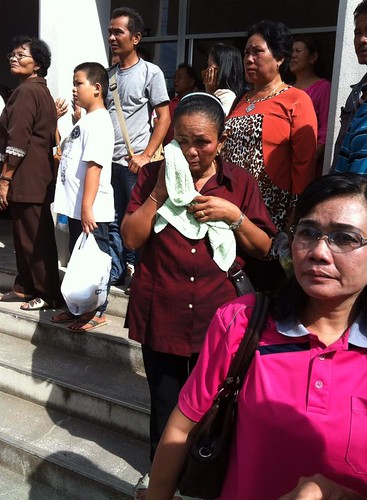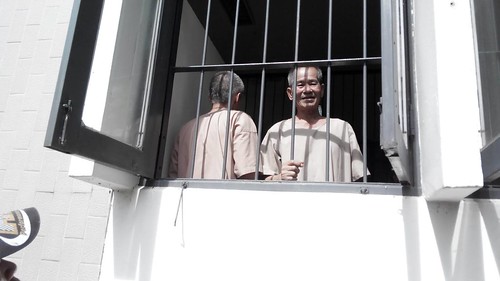The Military Court in Khon Kaen on Tuesday rejected bail for red-shirt defendants accused of planning a rebellion against the coup makers despite a lack of evidence, while their lawyers objected to having the case tried in a military court.
The nickname ‘Khon Kaen Model’ was given to the case of 26 defendants, mostly elderly, from several provinces in the North East, accused of being hard-core red shirts who planned to rebel against the junta. The alleged planned operation would first be carried out in Khon Kaen, the second largest province in Isan and a stronghold of the red-shirt movement, followed by other provinces in the North and the North East.
The defendents line up to enter the military court
Benjarat Meetien, a lawyer representing 15 defendants, told Prachatai on Wednesday that she has filed a petition with the Khon Kaen Military Court to rule whether it has jurisdiction over the cases, while Winyat Chatmontree, another lawyer from the Free Thai Legal Aid (FTLA), who represents the 11 other defendants, on Tuesday requested 400,000 baht bail for each of his clients. However, the judge refused to allow bail, citing flight risk and the severity of the cases.
Benjarat reasoned in the petition that since all the suspects were accused of committing the crimes on 23 May, which was before the enactment of junta’s announcement that all cases concerning national security would be tried by the military courts, therefore the cases should be handled by the civilian courts.
Most of the defendants are elderly
The junta issued its announcement on May 25, stating that cases related to national security and lèse majesté would be tried in military courts. The Royal Gazette, however, published the announcement on May 30. According to Thai law, a law, even an order under martial law, officially comes into force a day after being published in the Royal Gazette.
Therefore, in the case of the Khon Kaen Model, the alleged commission of the crime came before the NCPO’s announcement came into force, Benjarat explained.
The lawyer said she is determined to have the cases tried in a civilian court as it has more credibility than the military court.
“They are the same entity. [The military] itself arrested them and issued the order. And they themselves will try the cases?” Benjarat said in a phone interview.
According to a police press conference held in late May, the alleged rebel plan had four stages:
- Mobilize as many people as possible
- Negotiate with the authorities to have them disarmed
- Negotiate with the military
- Overthrow the financial institutions and break the banks to give money to the poor. The final stage is codenamed “Zero Debt All over the Land.”
- The police added that if the alleged Khon Kaen Model operation was successful, other provinces, especially in the North, would follow.
The 26 red shirts face the following charges:
- Defying the order of the junta’s National Council for Peace and Order (NCPO) which prohibits gatherings of more than five people
- Accumulating weapons, ammunition, and forces and conspiracy to cause terrorism
- Collecting weapons for planned terrorist plots
- Criminal association
- Illegal possession of weapons
- Illegal possession of ammunition
- Carrying weapons in public
- Unauthorized possession of weapons and ammunition
- Unauthorized possession of radio communication devices
However all the suspects, mostly aged 40-70 years old, denied the allegations during the deposition hearing on Tuesday.

During the deposition hearing on Wednesday, the court only allowed the defendants, the lawyers and an observer into the courtroom, disappointed families and relatives of the defendants. The court claimed the courtroom was too small.
The 22 of 26 were arrested during a raid at an apartment in Khon Kaen a day after the coup d’état, and were detained at a military camp for seven days before four other suspects were caught and joined them. They have been detained since the arrests.
According to Winyat, the military found no weapons in the apartment and at the houses of defendants. He has petitioned to the military prosecutor to clarify on the evidence. The clarification meeting is scheduled on 2 December.
The military claimed that the group rented the entire floor of the apartment for two months for their operations. According to
Isaan Record, an alternative media from the Northeast, however, the staff of the apartment said that the group did not rent the whole floor and were planned to stay only a night to peacefully discussed about the red-shirt response to the coup d’état.
He added that the evidences presented by the military are too weak and disproportionate with the severity of the charges.
During the deposition hearing on Wednesday, the court only allowed the defendants, the lawyers and Kingsley Abbott, observer from International Commission of Jurists (ICJ) to be in the courtroom, disappointed families and relatives of the defendants. The court claimed the courtroom was too small.
The families and relatives of the defendants





